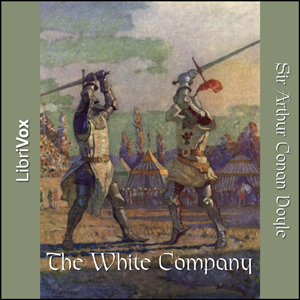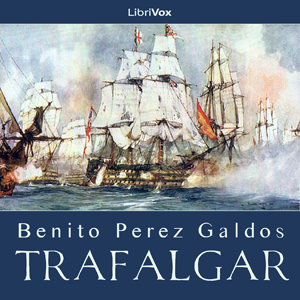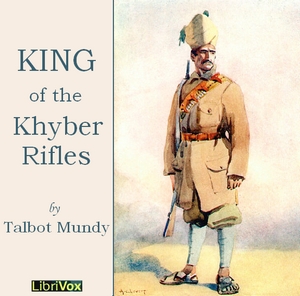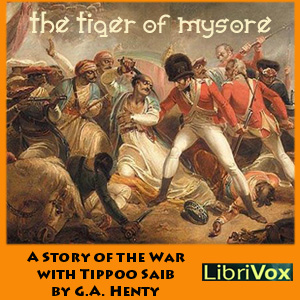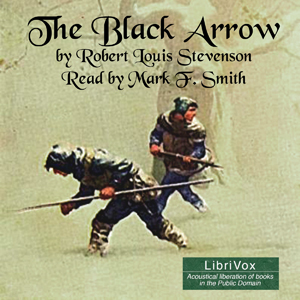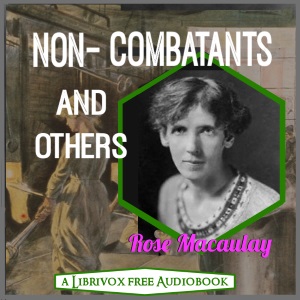This is a short novel published in 1895 and based vaguely on the battle of Chancellorsville of the American Civil War. Unlike other works on the subject, Crane's novel does not concentrate on the big picture or the glory of war but on the psychology of one of its soldiers.
24 episodes
The Good Soldier (1915) "... is set just before World War I and chronicles the tragedies of the lives of two seemingly perfect couples. The novel is told using a series of flashbacks in non-chronological order, a literary technique pioneered by Ford. It also makes use of the device of the unreliable narrator, as the main character gradually reveals a version of events that is quite different from what the introduction leads you to believe. The novel was loosely based on two incidents of adultery and on Ford's messy personal life.” (Summary by Wikipedia)
Music in sections 1-5 "Minuet in G flat major and Valse Bluette" by Beethoven.
20 episodes
Greenmantle is the second of five Richard Hannay novels by John Buchan, first published in 1916 by Hodder & Stoughton, London. It is one of two Hannay novels set during the First World War, the other being Mr Standfast (1919); Hannay's first and best-known adventure, The Thirty-Nine Steps (1915), is set in the period immediately before the war started. - Hannay is called in to investigate rumours of an uprising in the Muslim world, and undertakes a perilous journey through enemy territory to meet up with his friend Sandy in Constantinople. Once there, he and his friends must thwart the Germans' plans to use religion to help them win the war, climaxing at the battle of Erzurum. (Summary from Wikipedia)
22 episodes

A Game for Boys from twelve years of age to one hundred and fifty and for that more intelligent sort of girl who likes boys' games and books. With an Appendix on Kriegspiel
Miniature wargaming got its start with the publication in 1913 of this thoroughly entertaining little account of how H.G. Wells, with certain of his friends, took their childhood toys and turned play into acceptable middle-aged sport by subjecting the exercise to the civilizing influence of actual rules.While wargaming progressed far past these beginnings, Wells observes how "little wars" with even his elementary rules can suggest the wholesale crudity of the real thing."You have only to play at Little Wars three or four times to realise just what a blundering thing Great War must be. Great War is at present, I am convinced, not only the most expensive game in the universe, but it is a game out of all proportion. Not only are the masses of men and material and suffering and inconvenience too monstrously big for reason, but--the available heads we have for it, are too small. That, I think, is the most pacific realisation conceivable, and Little War brings you to it as nothing else but Great War can do."Wells leaves almost hanging the tantalizing concept that we might someday simulate war, as an instrument of international decision-making, rather than practice actual combat. But most of this book is just the fun of evicting the boys from the playroom and spending happy days there, away from the "skirt-swishers", developing the framework under which two gentlemen might meet and accumulate boastable victories! (Summary by Mark F. Smith)
5 episodes
Set during the Hundred Years' War with France, The White Company tells the story of a young Saxon man who is learning what it is to be a knight. Raised by Cistercian Monks and rejected by a violent elder brother, Alleyn Edricson takes service with one of the foremost knights in the country. When Alleyn falls in love with the knight's daughter, he must prove himself to be a courageous and honourable knight before he can win her hand. Alleyn and his friends set forth with the other men-at-arms to join Prince Edward in Bordeaux, from where they will take part in the Prince's campaign into Spain. It is in Spain that Alleyn and others must prove themselves to be very valiant and hardy cavaliers. (Summary by Clive Catterall)
38 episodes
We have had many novels about alternate histories, often of the 'What would have happened if Hitler had won the war' type and this is another - except that this one is set in 1913 and the 'William' of the title is that old bogeyman 'Kaiser Bill'. For some reason, at the height of Britain's power, the fear of invasion was common at that time. (See The Riddle of the Sands, The Battle of Dorking, Spies of the Kaiser or even The War of the Worlds)WARNING: Contains mild anti-semitism and jingoism typical of the period. (Summary by Andy Minter)
19 episodes
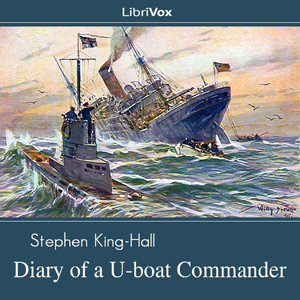
Captain Karl von Schenk of the Kaiser's Navy is a stereotypical German nobleman - supremely self-confident, touchy about the divisions of class and any infringement on his place. He thinks he is handsome, has a suitably manly physique, an excellent singing voice, and a facility with writing. His wartime service related in his diary is a series of triumphs over harrowing circumstances, bringing his boat back in spite of the best efforts of the Royal Navy to stop him.His one vulnerability is a young lady he meets on leave in Bruges, Belgium. Although she is the trophy girlfriend of a German colonel who could cause him much harm if he were to find out, von Schenk pursues his Zoe with Teutonic straightforwardness. And both he and the reader are entirely blind-sided by the unexpected thunderclap that puts an end to the sweet affair.Stephen King-Hall, a Royal Navy officer during the war and writing as "Etienne", penned this book as if he had simply discovered it on a surrendered submarine. In fact, some editions of the book list the author as "anonymous." King-Hall's knowlege of naval affairs lend authority to this yarn of men that go to the sea in ships that sink... on purpose. (Summary by Mark F. Smith)
12 episodes

Mark Twain's work on Joan of Arc is titled in full "Personal Recollections of Joan of Arc, by the Sieur Louis de Conte." De Conte is identified as Joan's page and secretary. For those who've always wanted to "get behind" the Joan of Arc story and to better understand just what happened, Twain's narrative makes the story personal and very accessible.The work is fictionally presented as a translation from the manuscript by Jean Francois Alden, or, in the words of the published book, "Freely Translated out of the Ancient French into Modern English from the Original Unpublished Manuscript in the National Archives of France."It was originally published as a serialization in Harper's Magazine beginning in 1895 and later published in book form in 1896. However the Harper's editors decided to cut 12 chapters that describe much of Joan's Great Trial, saying the chapters were not suitable for serialization since, "They will not bear mutilation or interruption, but must be read as a whole, as one reads a drama." This recording contains the complete text!De Conte is a fictionalized version of Joan of Arc's page Louis de Contes, and provides narrative unity to the story. He is presented as an individual who was with Joan during the three major phases of her life - as a youth in Domremy, as the commander of Charles' army on military campaign, and as a defendant at the trial in Rouen. The book is presented as a translation by Alden of de Conte's memoirs, written in his later years for the benefit of his descendants.Twain based his descriptions of Joan of Arc on his daughter, Susy Clemens, as he remembered her at the age of seventeen.Twain said, "I like Joan of Arc best of all my books; and it is the best; I know it perfectly well. And besides, it furnished me seven times the pleasure afforded me by any of the others; twelve years of preparation, and two years of writing. The others needed no preparation and got none." (Summary by Wikipedia and John Greenman)
75 episodes
6 Novellen über den Krieg. 6 tragische Menschenschicksale. 6 Geschichten über die Auswirkungen des 1. Weltkrieges. Geschichten über Angst, Schuldgefühle, Trauma, Wut ... Sie zeigen die Sinnlosigkeit des Krieges und schildern anschaulich - teils sehr graphisch - die Zustände an der Front und zu Hause und die inneren Beweggründe der Protagonisten. Der Autor richtet gekonnt und ergreifend den Krieg, aber nicht den Menschen - selbst die vermeintlichen Antagonisten sind einfach nur Menschen mit tragischem Schicksal. (Zusammenfassung von Julia Niedermaier)
7 episodes
Trafalgar, es el primero de los 46 Episodios Nacionales, escritos por Benito Pérez Galdós, que es considerado el mayor novelista español después de Cervantes. Galdós narra la intervención de Gabriel Araceli, al servicio de D. Alonso Gutiérrez de Cisniega, capitán de navío, en la batalla de Trafalgar a los catorce años de edad, el 21 de Octubre de 1805. Ante el promontorio de Trafalgar las naves inglesas, a las órdenes de Nelson, se enfrentaron a la flota franco-española en la legendaria batalla que supuso el comienzo del dominio inglés en los mares y la primera derrota de Napoleón. La novela describe la niñez de Gabriel, sus primeros amores, el embarco en la nave Santísima Trinidad y su participación en la cruenta batalla.
La Primera Serie
1 - Trafalgar
2 - La corte de Carlos IV
3 - El 19 de marzo y el 2 de mayo
4 - Bailén
5 - Napoleón en Chamartín
6 - Zaragoza
7 - Gerona
8 - Cádiz
9 - Juan Martín el Empecinado
10 - La batalla de los Arapiles
17 episodes

This 1923 Pulitzer Prize winning novel was written by Willa Cather. This work had been inspired by reading her cousin G.P. Cather's wartime letters home to his mother. He was the first officer from Nebraska killed in World War I. Claude Wheeler, the subject of the novel, is a young man growing up on a Nebraska farm. The son of well to do parents, Claude is troubled by his apparent inability to find purpose with his life. Everything he does seems to turn out wrong, at least in his own mind. Although he is a skilled farmer, Claude believes his destiny lies elsewhere. While attending a church-affiliated college his parents have selected for him, he befriends a German family (the Ehrlichs’) who open his eyes to other possibilities in life. When Claude’s father expands the Wheeler farming interests, Claude must leave college to return to his roots and operate the Wheeler farm. During this period, he marries a childhood friend, Enid, in what turns out to be a marriage of convenience rather than love. Enid tries to convert her new husband to her many other causes such as Prohibition in Nebraska. Eventually, Enid leaves Claude to care for her missionary sister who is ill in China, and Claude is somewhat relieved to see her go. During this period, Europe is ablaze with World War I. Claude and his mother fervently follow the events. Claude eventually enlists in the American Expeditionary Forces, becomes an officer, and travels to France to fight for the cause. Finally believing he has found purpose in his life, Claude revels in his new freedom and responsibilities. Despite an influenza epidemic and the continuing hardships of the battlefield, Claude has never felt as though he mattered more. His pursuit of vague notions of purpose and principle culminate in a ferocious front-line encounter with an overwhelming German onslaught. (Summary by Tom Weiss and Wikipedia)
72 episodes
Mid-WWI, staid Englishwoman Miss Perdita Pim suffers a sunstroke gardening & gains the power of invisibility. She becomes a super-secret agent, going behind German lines, sometimes visible, sometimes not, witnessing atrocities & gleaning valuable war information. (Summary by Grant Hurlock)
31 episodes
In his startling and tragic novella Farewell (‘Adieu’), Balzac adds to the 19th century’s literature of the hysterical woman: sequestered, confined in her madness; mute, or eerily chanting in her moated grange. The first Mrs Rochester lurks in the wings; the Lady of Shalott waits for the shadowy reflection of the world outside to shatter her illusion. Freud’s earliest patients will soon enter the waiting-room in their turn.
Whilst out hunting two friends come across a strange waif-like woman shut up in a decaying chateau which one of them dubs “the Palace of the Sleeping Beauty”. Soon we are dragged back to the terrible masculine reality of the 1812 retreat of Napoleon’s army from Moscow and the grotesque massacre that was to traumatise the heroine, parting her from her lover.
Their reunion is more desperate still, as the earlier event is recreated in a bizarre and vain attempt to root out madness and compel the return of happiness…
(Summary by Martin Geeson)
8 episodes
Writing at the end of the American Civil War, Verne weaves this story of a Scottish merchant who, in desperation at the interruption of the flow of Southern cotton due to the Union blockade, determines to build his own fast ship and run guns to the Confederates in exchange for the cotton piling up unsold on their wharves. His simple plan becomes complicated by two passengers who board his new ship under false pretenses in order to carry out a rescue mission, one which Capt. Playfair adopts as his own cause. This is going make the Rebels in Charleston rather unhappy with him.Sure, his new ship is fast - but can it escape the cannonballs of both North and South? (Summary by Mark Smith)
10 episodes
Three Soldiers is a 1920 novel by the American writer and critic John Dos Passos. It is one of the key American war novels of the First World War, and remains a classic of the realist war novel genre. H.L. Mencken, then practicing primarily as an American literary critic, praised the book in the pages of the Smart Set. "Until Three Soldiers is forgotten and fancy achieves its inevitable victory over fact, no war story can be written in the United States without challenging comparison with it--and no story that is less meticulously true will stand up to it. At one blast it disposed of oceans of romance and blather. It changed the whole tone of American opinion about the war; it even changed the recollections of actual veterans of the war. They saw, no doubt, substantially what Dos Passos saw, but it took his bold realism to disentangle their recollections from the prevailing buncombe and sentimentality." (Summary from Wikipedia)
17 episodes
It is a fictional tale of cavalry actions during the U.S. Civil War, under General John Morgan. (Summary by M. Craun)
27 episodes

The Zeppelin’s Passenger is a tale of German espionage in England during World War I. Dreymarsh is a fictional “backwater” area in England with no apparent military value. The story begins with Dreymarsh residents discovering an observation car from a German zeppelin along with a Homburg hat near Dreymarsh. The mystery is further complicated when an Englishman, Mr. Hamar Lessingham, presents himself at Mainsail Haul which is the residence of Sir Henry Cranston. Lessingham bears with him, hand-carried letters from Major Richard Halstead, and a British prisoner of war in Germany. He presents them to Halstead’s sister, Phillipa and Helen, Halstead’s fiancée who have had no word of Richard’s fate and are deeply concerned. Phillipa, Sir Henry’s wife, is smitten with Lessingham, after Sir Henry appears to her to be a coward since he will not become involved in the war effort. Lessingham appears to be the perfect gentlemen but he is not who he pretends to be. Eventually, Phillipa and Helen discover that the delivery of Halstead’s letters come with a price. All becomes clear near the end to discover the secret of Lessingham, Sir Henry, and Mainsail Haul. (Summary by Tom Weiss)
33 episodes
La Corte de Carlos IV es el segundo de la primera serie de los 46 Episodios Nacionales, escritos por Benito Pérez Galdós, que es considerado el mayor novelista español después de Cervantes. Galdós narra la continuación de las aventuras de Gabriel Araceli, al servicio, ahora, de una rica dama bien relacionada en la Corte del rey Carlos IV.
La Primera Serie
1 - Trafalgar
2 - La corte de Carlos IV
3 - El 19 de marzo y el 2 de mayo
4 - Bailén
5 - Napoleón en Chamartín
6 - Zaragoza
7 - Gerona
8 - Cádiz
9 - Juan Martín el Empecinado
10 - La batalla de los Arapiles
28 episodes
Athelstan King is a British Secret Agent stationed in India at the beginning of WWI. He is attached to the Khyber Rifles regiment as a cover, but his real job is to prevent a holy war. "To stop a holy war single-handed would be rather like stopping the wind--possibly easy enough, if one knew the way." King is ordered to work with a mysterious and powerful Eastern woman, Yasmini. Can King afford to trust her? Can he afford not to? Introduction by Brett W. Downey
18 episodes
During the Indian war with Tippoo Saib, 15 year old Dick Holland and his mother set out from England to find and rescue his father, shipwrecked 6 years earlier, and believed to be held prisoner by the 'Tiger of Mysore'(summary by annise)
22 episodes
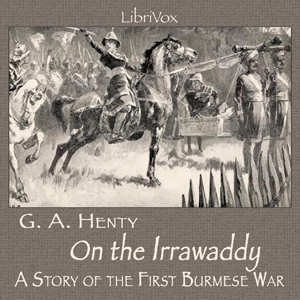
With the exception of the terrible retreat from Afghanistan, none of England's many little wars have been so fatal--in proportion to the number of those engaged--as our first expedition to Burma. It was undertaken without any due comprehension of the difficulties to be encountered, from the effects of climate and the deficiency of transport; the power, and still more the obstinacy and arrogance of the court of Ava were altogether underrated; and it was considered that our possession of her ports would assuredly bring the enemy, who had wantonly forced the struggle upon us, to submission. Events, however, proved the completeness of the error. The Burman policy of carrying off every boat on the river, laying waste the whole country, and driving away the inhabitants and the herds, maintained our army as prisoners in Rangoon through the first wet season; and caused the loss of half the white officers and men first sent there. The subsequent campaign was no less fatal and, although large reinforcements had been sent, fifty percent of the whole died; so that less than two thousand fighting men remained in the ranks, when the expedition arrived within a short distance of Ava. Not until the last Burmese army had been scattered did the court of Ava submit to the by no means onerous terms we imposed.
19 episodes
A tale of Victorian-style romance, maritime battles and even the penultimate Napoleonic battle - Waterloo. (Introduction by Mike Harris)
20 episodes
This story is based upon the experiences of two Belgian refugees in World War I. When their parents are marched of by Germans, Jan and Marie are left alone. Now they, along with their dog, have to find their parents! (Summary by ashleighjane)
15 episodes

Like many soldiers at the beginning of their military careers, Harry Penrose has romantic ideas of climbing the ranks and attaining hero status. However, while stationed at Gallipoli, the realities of war begin to take their toll on Penrose, not only physically, but also mentally where the war has become a 'battle of the mind.' This is his story as related by a fellow soldier, as well as the story of the campaign at Gallipoli which is vividly portrayed from the author's own personal experiences.During his tenure as an officer, Penrose slowly asserts himself; the war takes a toll on his personality, but he begins to live up to his early dreams of heroism. However, his creeping self-doubt grows by degrees; following Gallipoli, he is reassigned from his post as scouting officer once on the Somme, knowing he cannot face another night patrol, and earns the wrath of his commanding officer - an irascible Regular colonel - over a trivial incident. The colonel piles difficult, risky work on him - remarking to the narrator that "Master Penrose can go on with [leading ration parties] until he learns to do them properly" - and Penrose submits, working doggedly to try and keep from cracking. After a long period of this treatment, by the winter of 1916, Penrose's spirit is worn down. What follows his downward spiral may surprise and even shock today's readers, but was common and controversial at the time. (Introduction adapted from Wikipedia with contributions from the narrator and the proof listener.)
13 episodes

Chaque mois, nous choisissons un poème qui est enregistré par un maximum de librivoxeurs ais.Ce poème est sans doute inspiré au jeune Rimbaud, 16 ans à l'époque, par la guerre franco-allemande de 1870, et plus particulièrement par la bataille de Sedan scellant la défaite française le 3 septembre 1870 à moins de 100 kilomètres de Charleville, son lieu de résidence à l'époque.(Wikipedia) Le dormeur du val
C'est un trou de verdure où chante une rivière,
Accrochant follement aux herbes des haillons
D'argent ; où le soleil, de la montagne fière,
Luit : c'est un petit val qui mousse de rayons.
Un soldat jeune, bouche ouverte, tête nue,
Et la nuque baignant dans le frais cresson bleu,
Dort ; il est étendu dans l'herbe, sous la nue,
Pâle dans son lit vert où la lumière pleut.
Les pieds dans les glaïeuls, il dort. Souriant comme
Sourirait un enfant malade, il fait un somme :
Nature, berce-le chaudement : il a froid.
Les parfums ne font pas frissonner sa narine ;
Il dort dans le soleil, la main sur sa poitrine,
Tranquille. Il a deux trous rouges au côté droit.
6 episodes
This is a bilingual project. The first part, in Hebrew, is the story "Injustice" by Yosef Haim Brenner, written following the conquest of Palestine by the British troops during WWI. The story takes place on the Turkish side of the dividing line between the combating forces. An escaped British prisoner of war had taken shelter among a group of Jewish workers, who, following a heated discussion, turned him over to the Turkish army. The second part of this project, in English, is a chapter in the book "The Escaping Club," written in 1922 by the same British prisoner of war, the aviator A. J. Evans, who gave his account of the same event. (Summary by Omri Lernau)
6 episodes

The Four Horsemen of the Apocalypse, by Vicente Blasco Ibañez and translated into English by Charlotte Brewster Jordan, depicts two branches of a family with its roots in the pampas of Argentina. The wealthy Argentinian, Julio Madariaga, comes from Spain and raises himself from poverty, becoming a self-made, wealthy cattleman. He is a man of extremes; an honest man with a rascally knack for taking advantage of others; a self-made man with overweening pride, prejudices, and a sharp, flinty temper that can spark into violence, he is at the same time given to great generosity toward those who are under him. This almost feudal lord has two daughters who marry expatriates, a Frenchman and a German.Julio Madariaga leaves his stamp on these two families who, after his death, return to the native countries of his two sons in law. At that time, the mood of Europe is in many ways similar to that of the old gaucho, a mixture of generosity, explosive anger, romanticism, strong prejudices, and wounded pride, a mood composed of extremes painted on an oversized canvas. World War I is waiting in the wings and will leave its own stamp on the old gaucho's lineage, pitting them against each other on opposite sides in the violent first year that many think will last only a few months but will, in fact, result in improbable destruction and loss of lives. An old Russian visionary given to drink, looks out on red skies one day and experiences its coming in a vision: hoofbeats; and riders. --Summary by Tony Oliva and released to public domain.
72 episodes

”War and Peace” is a panoramic novel: It is its own justification, and perhaps needs no introduction. It always reminds the translator of a broad and mighty river flowing onward with all the majesty of Fate. On its surface, float swiftly by logs and stumps, cakes of ice, perhaps drowned cattle or men from regions far above. These floating straws, insignificant in themselves, tell the current. Once embark upon it, and it is impossible to escape the onward force that moves you so relentlessly. What landscapes you pass through, what populous towns, what gruesome defiles, what rapids, what cataracts! The water may be turbid, or it may flow translucent and pure, – but still it rushes on. Such to me is “War and Peace.”“War and Peace,” like all of Count Tolstoi’s works, is a mighty protest against war. There is no arguing in it about the waste, and the demoralization, and the cruelty, and the unmanliness of it, but, like all Russian argument, it is by vivid pictures such as no one can resist.
The present translation has been made from the original Russian. Tolstoi has been felicitously called “the Russian Rembrandt.” It is not fair to reproduce Rembrandt as a Teniers. One may be sometimes tempted to substitute the curved line of beauty for the straight line of duty, or soften a harsh silhouette, but beyond certain unavoidable issues of the sort necessary for reproducing the impression given by the original, the translator ought to be as faithful as possible. Here the old law of an eye for an eye and a tooth for a tooth, repudiated by Count Tolstoi, ought to have a new application. (from the Preface by N.H. Dole)Volume 1Volume 2Volume 3 (to be recorded)Volume 4 (to be recorded)
66 episodes
It tells the story of Henry Esmond's twin grandsons, George and Henry Warrington. Henry's romantic entanglements with an older woman lead up to his taking a commission in the British army and fighting under the command of General Wolfe at the capture of Quebec. On the outbreak of the American War of Independence he takes the revolutionary side. George, who is also a British officer, thereupon resigns his commission rather than take up arms against his brother. (Summary by Wikipedia)
92 episodes
Eleven stories of war by the author of The Red Badge of Courage. Stephen Crane was an American author. He is recognized by modern critics as one of the most innovative writers of his generation. Crane's writing is characterized by vivid intensity, distinctive dialects, and irony. Common themes involve fear, spiritual crises and social isolation. His writing made a deep impression on 20th-century writers, most prominent among them Ernest Hemingway, and is thought to have inspired the Modernists and the Imagists. - Summary by Wikipedia and david wales
19 episodes
William – an Englishman is a 1919 novel by Cicely Hamilton. The novel explores the effect of the First World War on a married couple during the rise of Socialism and the Suffragette movement. It was originally published by Skeffington & Son before being reprinted by Persephone Books in 1999. Described as 'a passionate assertion of the futility of war' by The Spectator, William - an Englishman won the first Prix Femina-Vie Heureuse Anglais prize in 1920. - Summary by Wikipedia
18 episodes
"Mr. Britling Sees It Through" is H. G. Wells' attempt to make sense of World War I. It begins with a lighthearted account of an American visiting England for the first time, but the outbreak of war changes everything. Day by day and month by month, Wells chronicles the unfolding events and public reaction as witnessed by the inhabitants of one house in rural Essex. Each of the characters tries in a different way to keep their bearings in a world suddenly changed beyond recognition. This book was published in 1916 while the war was still in progress, so no clear resolution was possible. Wells did not know how long the war would last or which side would ultimately win, but he hoped that somehow, something good might eventually come of it. - Summary by Peter Eastman
35 episodes
Arthur Conan Doyle was deeply affected by the many wars fought during his lifetime. As many other writers, he used the material for short stories, a collection of which is presented here. - Summary by Carolin
17 episodes
Quinta novela de la tercera serie de los Episodios Nacionales. Primera Guerra Carlista. El general Ramón Cabrera participa en La Campaña del Maestrazgo. Don Beltrán de Urdaneta, noble aragonés, se topa con una serie de riesgos e infortunios, en medio de la guerra fratricida, cuando intenta recuperar un dinero de un campesino a quien vendió sus tierras, para pagar las deudas que ha generado su vida disoluta. En su intento de conseguir los fondos de que tiene necesidad, tendrá que enfrentarse a los criterios completamente distintos de la monja Marcela, que busca el lugar donde su difunto padre escondió las riquezas antes de morir, con objeto de donarlas a cierto monasterio. Don Beltrán ha perdido toda esperanza de recuperar el dinero, a pesar de las promesas que le hizo el padre de Marcela. En esto, el joven militar Nelet se cruza en su camino con el deseo de que Marcela corresponda a su amor por ella y... (Resumen de Tux)
31 episodes

Sevastopol Sketches (Russian: Севастопольские рассказы, Sevastopolskiye rasskazy) are three short stories written by Leo Tolstoy and published in 1855 to record his experiences during the Siege of Sevastopol (1854–1855) in the Crimean War (1853-1856). The name originates from Sevastopol, a city in Crimea. The book has also been released under the anglicized title The Sebastopol Sketches and is sometimes titled Sevastopol Stories. These brief "sketches" formed the basis of many of the episodes in Tolstoy's magnum opus, War and Peace.
Sevastopol in December: In Sevastopol in December, Tolstoy uses second person narrative (with the pronoun 'you') in an introductory tour of life in Sevastopol. The detailed tour is arguably similar to one Tolstoy may have been given upon arrival in Sevastopol in November, 1854…. Tolstoy also uses Sevastopol in December to introduce the reader to the settings, mannerisms, and background he uses in Sevastopol in May and Sevastopol in August. For example, when referring to the enemy, either the British or the French, but only the French are featured in the Sketches; they are referred to as " 'him', as both soldiers and sailors say".
Sevastopol in May In Sevastopol in May, Tolstoy examines the senselessness and vanity of war. The story examines many aspects of the psychology of war, heroism, and the misleading presence of humanism in truces (misleading because countries continuously go to war with one another, despite past truces). Tolstoy concludes by declaring that the only hero of his story is truth.
- Summary by wikipedia and david wales
22 episodes
Havoc occurs when European countries are discussing covert alliances. The story revolves around the creation of a secret alliance between Germany, Russia, and Austria. The English hope to split Russia away by holding the Czar to his previous public commitments, but they need proof of what was done to create the pressure. All the pressures that lead to WWI are there, but the intrigues and secret treaties create an interesting background to the twists and turns of the plot. (Summary by Tom Weiss
38 episodes
Another remarkable World War I novel by Romer Wilson, "If All These Young Men" is a character study of a group of young 20-something friends in England dealing with the looming, grey presence of the War in their lives. The story begins on Good Friday 1918, and centers on Josephine Miller, a restless, strong-minded young woman who cannot tolerate trivialities or frivolities so long as the War goes on, and who agonizes over how to go on living in its shadow. The characters of Josephine and her friends are patterned on those of Wilson and her own coterie at the time, both male and female, revealing the profound angst of young intellectuals of the time who lived under the dread not only of invasion and national destruction, but also of the alien world that would be left for them when the monstrous conflict was over. - Summary by Expatriate
31 episodes
A conference of European nations is being held in the Hague. England has not been invited to attend. Some think war is about to break out. Mr. John P. Dunster, an American, is traveling to the Hague with an important document that may prevent the outbreak of war when he mysteriously disappears after a train wreck in England. Richard Hamel is asked by the British government to attempt to solve the mystery of Dunster’s disappearance and prevent the outbreak of war in Europe. - Summary by Richard Kilmer
36 episodes

I am inclined to rank Count Tolstoy not among the realists or naturalists, but rather as an impressionist. He is often careless about accuracy. Numberless incongruities can be pointed out. He is as willing to adopt an anachronism as a medieval painter. I would defy an historian to reconstruct the battle of Austerlitz from Count Tolstoy's description. And yet what a picture of a battle was ever more vivid! It is like a painting where the general impression is true, but a close analysis discovers nothing but contradictory lines!What a succession -- a kaleidoscopic succession of life-views, he gives in "War and Peace!" One follows the other without confusion, naturally, with entrancing interest. "The court and camp, town and country, nobles and peasants, -- all are sketched in with the same broad and sure outline. We pass at a leap from a soiree to a battle-field, from a mud hovel to a palace, from an idyl to a saturnalia. As we summon our recollections of the prodigal outpouring of a careless genius, a troop of characters as lifelike as any in Scott or in Shakespeare, defile before our mental eye. Tolstoy finds endless opportunities of inculcating his favorite themes: -- the mastery of circumstance over will and desire, the weakness of man in the front of things, and the necessity for resignation." (from the Preface by N.H. Dole)Volume 1Volume 2Volume 3 (to be recorded)Volume 4 (to be recorded)
98 episodes
Grace continues her war adventures over seas in France, continuing her work for the Red Cross. Set during World War I, Loyal Heart finds herself in much peril as she helps with the fight against the Germans. Summary by ashleighjane
24 episodes
When Captain Henri Ravignac married Marie Gessler, he was mistakenly thinking she was French. But Marie is in fact German, and her command of the French language and culture makes her a perfect spy. At the first opportunity, she double-crossed Captain Ravignac and stole valuable documents from him, which makes her a great candidate for espionage when World War I breaks out. Travelling with the documents of Countess d'Aurillac, she moves behind enemy lines, but the life of a spy is typically turbulent and short... - Summary by Carolin
3 episodes
An English translation of the French World War I novel "Le Feu", written by a French soldier and dedicated to "the memory of the comrades who fell by my side at Crony and on Hill 119." Barbusse was invalided out of the army after 17 months in 1915, and given a clerical job, during which time he penned this work. He was greatly influenced by the Russian Revolution and joined the communist party. - Summary by Lynne Thompson
28 episodes
In the unsettled years of England's War of the Roses, where a man stood on the issue of kingship could make his fortune... or end his life. Dick Shelton, a nobly-born lad, is on the cusp of manhood, and he is thrust bodily into this stew where allegiances shift under one's feet. Circumstances cause him to fall in with a gentlemaiden in boy's disguise. Until he learns of the deception, Dick is unaware that the young lady is an heiress whom his guardian Sir Daniel had kidnapped. And the introduction of an outlaw with a penchant for putting black arrows into the bodies of the men who had wronged him affords Dick a worrying hint - that Sir Daniel might have been the man that had murdered Dick's father! - Summary by Mark F. Smith
33 episodes
This collection of non-fiction and fiction pieces is the third volume commemorating the First World War. The majority of the items, all chosen by the readers, are in English, but the collection also includes pieces in Dutch, French, German, Italian and Portuguese.
Please note that some works are still protected by copyright in countries which observe copyright laws based on the author's date of death.
Most items were written during or shortly after the war, but one or two have been included for their relevance in other ways. For more information about each piece, please see this document (PDF format), which also shows the authors' dates of death. (Summary by Ruth Golding)
32 episodes
Through a variety of experiences of the effects of the First World War, an art student is drawn into pacifism. Rose Macaulay's satirical novel is passionate, and witty - Summary by Anthony Ogus
18 episodes
One of the most heart-breaking of all World War I novels, this family epic was written in the midst of the War itself, and shows the intense emotion generated in ordinary lives by that tragedy. May Sinclair astonishingly weaves multiple themes into her narrative, seamlessly drawing from the great movements of her day: suffrage, sexual liberation, artistic revolt, war, and pacifism. Her most powerful metaphor throughout the novel is that of the Vortex: the dangerously irresistible force of human masses, how to resist it and (much more difficult) how to participate in it without losing one’s individual autonomy. - Summary by Expatriate
25 episodes
"Armer Benno Stehkragen, dachte ich amüsiert, dir ist es im Leben kümmerlich genug gegangen, – und jetzt wird auch noch die Aufzeichnung deiner Lebensgeschichte von einem Granatsplitter durchbohrt!"
(Zitat aus dem Vorwort)
Das Buch wird meist als Satirewerk eingeteilt, fällt in die Sparte (Vor)Kriegsliteratur (und "Antihelden") und beschreibt in einer sentimentalen Traurigkeit - mit durchaus trocken-humorigen und lebensweisen Elementen - den Alltag eines normalen Lebens mit Tagträumen, Freuden und Leiden.
Anmerkung: Einige (Dialog-) Stellen sind im Dialekt geschrieben. Ich versuchte nicht, diese mir fremde Aussprache nachzuahmen und hielt mich eher an die inhaltliche/wörtlich-genaue Wiedergabe. Aber ich lade jede Frankfurterin und jeden Frankfurter herzlich dazu ein, dieses Buch als Version einzulesen! :-) (Zusammenfassung von schrm)
17 episodes

This 1915 novella was published as the First World War raged. "Belgium lies bleeding. Across her level, lush meadows the harsh-shod hosts of war have marched. Beside her peaceful waters the sons of God have spilled each other’s blood. Beneath her noble trees have raged the fires of human hate. Her king and his brave warriors have fought to save that which was their own and, driven back, have left their smiling land to suffer the desolation which has ever been the conqueror’s boast. Her ancient cities smoke. The inspired craftsmanship of an elder day has been destroyed forever. Belgium lies moaning. Across the winter sea we have heard the wailing of men and women among their ruined homes—honest townsfolk, simple Walloon and Flemish peasants, who had borne no malice and had done no wrong. And amid the cries of anguish and despair there have come to me the weeping of a little girl named Lisa and the voice of a faithful dog whining for his master."
- Summary by Author's Introduction and David Wales
8 episodes

This is the fourth volume of the 15-volume series of The World’s Story: a history of the World in story, song and art, edited by Eva March Tappan. Each book is a compilation of selections from prose literature, poetry and pictures and offers a comprehensive presentation of the world's history, art and culture, from the early times till the beginning of the 20th century. Topics in Part IV include Greek mythology, the classical Greek period and the Rise and Fall of the Roman Empire. - Summary by Sonia
Cast list for The sacrifice of Iphigenia:
Iphigenia: Devorah Allen / Chorus: alanmapstone / Messenger: Foon / Clytemnestra: Monika M.C. / Agamemnon: Tomas Peter / Narrator: Sonia
Cast list for The bout between the poets:
Dionysus: alanmapstone / Aeschylus: TJ Burns / Chorus: Monika M.C. / Euripides: Tomas Peter / Voice: Foon / Pluto: Nemo / Narrator: Sonia
Cast list for The sale of the philosophers:
Jupiter: alanmapstone / Mercury: Tomas Peter / First Customer: TJ Burns / Pythagoras: Foon / Second Customer: Sandra Schmit / Diogenes: Son of the Exiles / Third Customer: Angelique G. Campbell / Fourth Customer: Monika M.C. / Democritus: Jim Locke / Heraclitus: Devorah Allen / Socrates: Roger Melin / Fifth Customer: April6090 / Sixth Customer: Craig Franklin / Seventh Customer: ToddHW / Chrysippus: Larry Wilson / Eighth Customer: SaraHale / Ninth Customer: Eva Davis / Pyrrho: Nemo/ Narrator: Sonia
Cast list for At the funeral of Caesar:
First Citizen: alanmapstone / Second Citizen: Monika M.C. / Third Citizen: Foon / Fourth Citizen: TJ Burns / Brutus: Nemo / Antony: Tomas Peter / Narrator: Sonia
94 episodes
This is an overlooked novel by the author of House Of Mirth, Age Of Innocence, and more. She already became the first woman to win the Pulitzer prize for literature before this novel was written. Edith Wharton is known for her combination of social observations, criticism, and compassion. This WWI novel is told from the point of view of parents, forced to live their own lives when their son is at the front. John and Julia are divorced parents. When their only son George enlists, Julia and her second husband do their best to give him a desk job. But George shocks everybody by enlisting. His mother is horrified, his father and stepfather are secretly proud. But would he return alive? - Summary by Stav Nisser
36 episodes




